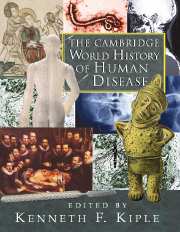Book contents
- Frontmatter
- Introduction
- Part I Medicine and Disease: An Overview
- Part II Changing Concepts of Health and Disease
- II.1 Concepts of Disease in the West
- II.2 Concepts of Disease in East Asia
- II.3 Concepts of Mental Illness in the West
- II.4 Sexual Deviance as a Disease
- II.5 Concepts of Heart-Related Diseases
- II.6 Concepts of Cancer
- Part III Medical Specialties and Disease Prevention
- Part IV Measuring Health
- Part V The History of Human Disease in the World Outside Asia
- Part VI The History of Human Disease in Asia
- Part VII The Geography of Human Disease
- Part VIII Major Human Diseases Past and Present
- Indexes
- References
II.1 - Concepts of Disease in the West
from Part II - Changing Concepts of Health and Disease
Published online by Cambridge University Press: 28 March 2008
- Frontmatter
- Introduction
- Part I Medicine and Disease: An Overview
- Part II Changing Concepts of Health and Disease
- II.1 Concepts of Disease in the West
- II.2 Concepts of Disease in East Asia
- II.3 Concepts of Mental Illness in the West
- II.4 Sexual Deviance as a Disease
- II.5 Concepts of Heart-Related Diseases
- II.6 Concepts of Cancer
- Part III Medical Specialties and Disease Prevention
- Part IV Measuring Health
- Part V The History of Human Disease in the World Outside Asia
- Part VI The History of Human Disease in Asia
- Part VII The Geography of Human Disease
- Part VIII Major Human Diseases Past and Present
- Indexes
- References
Summary
The semantic and logical quagmires that await anyone audacious enough to safari through the changing concepts of disease, illness, and health are portended by a cursory analysis of the definition formulated by the World Health Organization. “Health,” we are informed, “is a state of complete physical, mental and social well-being and not merely the absence of disease or infirmity” (Caplan, Engelhardt, and McCartney 1981). Aside from the fact that this seems more realistic for a bovine than a human state of existence, problems abound in what appears to be a fairly straightforward statement. The word “complete” immediately removes the definition from the realm of human reality. What is complete mental well-being, or physical for that matter? Worse still, the phrase “complete social wellbeing” is so freighted with individual interpretations that it alone renders the definition useless, if not pernicious.
This essay concentrates on ideas of physical health and disease, which is not to minimize the importance of psychiatric disease, but rather to admit that concepts of mental health and illness, although sharing most of the definitional difficulties of physical health and disease, are even more difficult to handle. In large part this is because with mental illness we lack the kinds of objective tools to measure brain function that have helped, though not resolved, questions of what constitutes health and disease in the physical realm. This is not, however, to deny the interconnectedness of the psychic and the physical, which is assumed in all of what follows.
Perhaps no one sentence captures the history of changing notions about disease better than a paraphrase of Humpty Dumpty’s haughty admonition: “When I use the word disease, it means just what I choose it to mean – neither more nor less.” mean - neither more nor less. A number of important considerations lead to this generalization. Among these are the following: (1) The definition of disease has varied with time and place in history; (2) the names assigned to diseases are ultimately abstractions, although it is useful at times to act as though they are real; (3) what we mean by diagnostic terms, as with words in general, can be discerned more accurately by what we do with them than what we say about them.
- Type
- Chapter
- Information
- The Cambridge World History of Human Disease , pp. 43 - 52Publisher: Cambridge University PressPrint publication year: 1993
References
- 2
- Cited by



